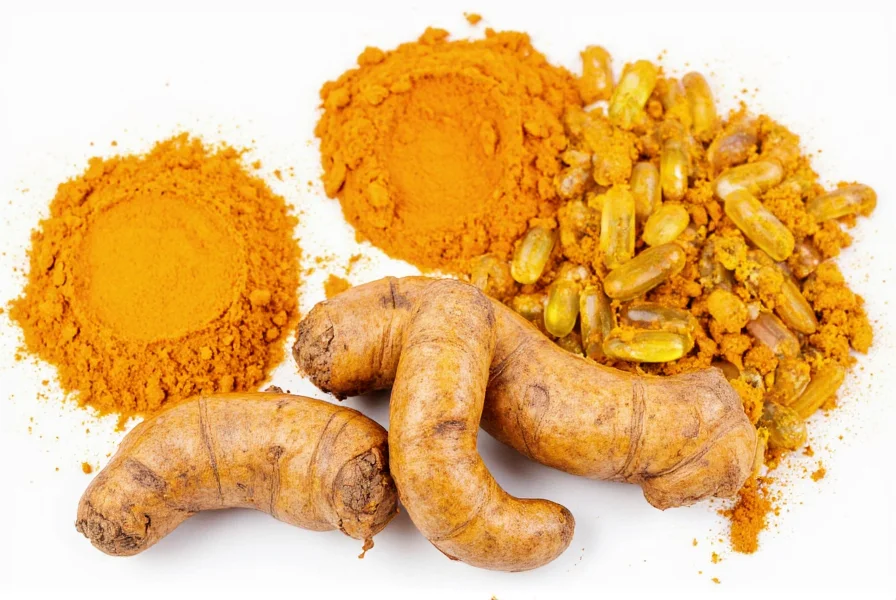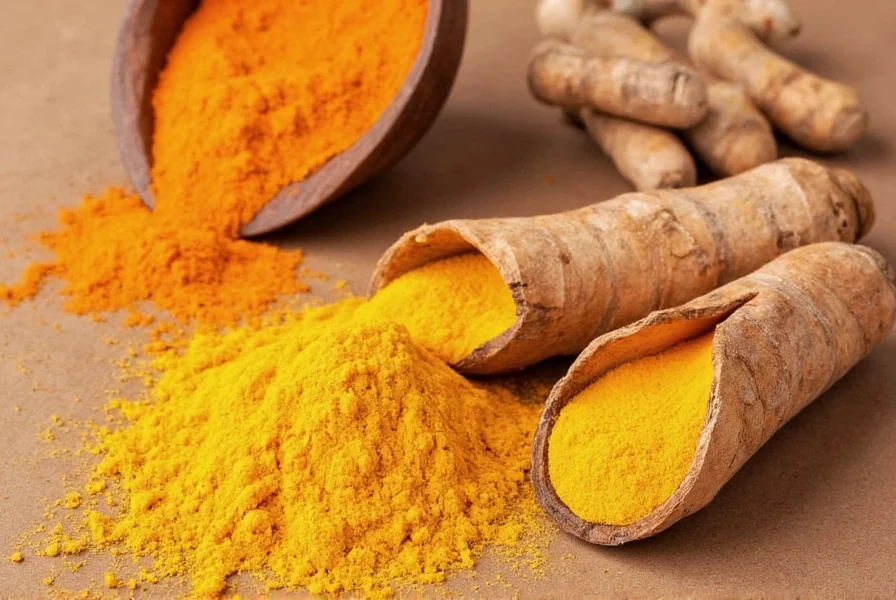The recommended daily turmeric dosage for adults ranges from 500 mg to 2,000 mg of curcumin (the active compound in turmeric), depending on the form and purpose. For culinary use, 1-3 grams (approximately 1/2 to 1 1/2 teaspoons) of ground turmeric per day is generally safe. Most clinical studies showing health benefits use 500-1,000 mg of curcumin supplements taken 1-2 times daily, often with black pepper to enhance absorption.
When determining how much turmeric should I take daily, it's essential to distinguish between culinary turmeric and concentrated supplements. Turmeric root contains only about 2-8% curcumin by weight, meaning you'd need to consume substantial amounts of the spice to reach therapeutic levels of curcumin. This distinction is critical for understanding daily turmeric dosage for inflammation and other health benefits.
Understanding Turmeric Forms and Their Potency
Turmeric comes in several forms, each with different curcumin concentrations that directly impact how much curcumin should I take per day:
| Form | Curcumin Content | Equivalent Daily Dosage |
|---|---|---|
| Fresh turmeric root | 2-5% curcumin | 20-60 grams (approximately 1-3 inches) |
| Ground turmeric powder | 3-6% curcumin | 1-3 grams (1/2 to 1 1/2 teaspoons) |
| Standardized curcumin extract | 95% curcumin | 500-1,500 mg |
| Curcumin with absorption enhancer | Varies (typically 25-500mg) | 250-1,000 mg |
Most people asking how much turmeric should I take daily are interested in therapeutic benefits rather than culinary use. For general wellness, 500 mg of curcumin once or twice daily represents the most researched and recommended amount. This addresses the common question about is 1000mg of turmeric too much—for standardized curcumin extracts, 1,000 mg daily (split into two doses) falls within the safe and effective range used in clinical studies.
Scientific Basis for Turmeric Dosage Recommendations
Research published in the Journal of Medicinal Food indicates that doses of 500-2,000 mg of curcumin daily demonstrate anti-inflammatory effects without significant side effects in most adults. A comprehensive review in Advances in Experimental Medicine and Biology concluded that 80-500 mg of curcumin taken 1-3 times daily provides optimal bioavailability for most health conditions.
The reason safe amount of turmeric to consume daily varies so significantly is due to curcumin's poor bioavailability. When consumed alone, curcumin has limited absorption. This explains why traditional Ayurvedic preparations often combine turmeric with black pepper (containing piperine) or healthy fats. Modern supplements address this with formulations like:
- Curcumin with piperine (black pepper extract)
- Liposomal curcumin
- Curcumin nanoparticles
- Curcumin phospholipid complexes
These enhanced formulations typically require lower doses—often 250-500 mg daily—to achieve similar blood levels as higher doses of standard curcumin.

Dosage Guidelines by Health Objective
Your specific health goals significantly influence the ideal turmeric supplement dosage guidelines. Research suggests different optimal doses for various conditions:
- General wellness and prevention: 500 mg curcumin once daily
- Inflammation reduction: 500 mg curcumin twice daily (total 1,000 mg)
- Joint pain management: 500 mg curcumin with 5 mg piperine twice daily
- Digestive support: 1-3 grams of culinary turmeric daily in food
- Cognitive health: 500-1,000 mg curcumin daily with absorption enhancer
A 12-week study in the Journal of Clinical Psychopharmacology found that 1,000 mg of curcumin daily significantly improved mood and memory in healthy adults. Meanwhile, research on daily turmeric dosage for inflammation typically uses 1,000-2,000 mg of curcumin divided into two doses.
Safety Considerations and Potential Side Effects
While turmeric is generally safe at recommended doses, understanding the recommended daily intake of turmeric for health benefits must include awareness of potential side effects:
- Digestive issues: High doses (over 1,500 mg curcumin) may cause nausea or diarrhea
- Blood thinning: Turmeric may enhance blood-thinning medications' effects
- Gallbladder concerns: May worsen gallstone or bile duct issues
- Pregnancy: Culinary amounts are safe, but supplements should be avoided
The European Food Safety Authority established an Acceptable Daily Intake (ADI) of 0-3 mg per kilogram of body weight for curcumin. For a 150-pound (68 kg) adult, this translates to approximately 200 mg of curcumin daily from all sources.
When to Consult a Healthcare Provider
Before establishing your personal how much turmeric should I take daily routine, consult a healthcare provider if you:
- Take blood-thinning medications (warfarin, aspirin, etc.)
- Have gallbladder disease or kidney stones
- Are scheduled for surgery within the next two weeks
- Are pregnant or breastfeeding
- Have diabetes (turmeric may lower blood sugar)
Many people wonder is 1000mg of turmeric too much—for standardized curcumin extracts, this is within the typical therapeutic range but may be excessive for certain individuals or when combined with other medications. A healthcare provider can help determine the appropriate dosage based on your specific health profile and goals.
Practical Tips for Daily Turmeric Consumption
To maximize the benefits of your daily turmeric dosage for inflammation or other health goals:
- Take curcumin supplements with a meal containing healthy fats
- Choose formulations with absorption enhancers like piperine
- Split larger doses (over 500 mg) into morning and evening servings
- Be consistent—therapeutic effects typically build over 4-8 weeks
- Start with lower doses and gradually increase to assess tolerance
For culinary use, adding black pepper and healthy fats (like olive oil or coconut milk) to turmeric-containing dishes significantly enhances curcumin absorption. A traditional golden milk recipe using 1 teaspoon turmeric, a pinch of black pepper, and coconut milk provides approximately 150-200 mg of curcumin per serving.
FAQs About Daily Turmeric Dosage
What is the maximum safe daily turmeric dosage?
For culinary turmeric, up to 3 grams (about 1 1/2 teaspoons) daily is generally safe. For curcumin supplements, most studies show safety up to 8,000 mg daily, but practical therapeutic doses range from 500-2,000 mg. The European Food Safety Authority recommends no more than 3 mg of curcumin per kilogram of body weight daily (approximately 200 mg for a 150-pound adult).
Can I take turmeric every day long-term?
Yes, turmeric can be taken daily long-term at appropriate doses. Studies have shown safety for continuous use up to 9 months at 500 mg curcumin twice daily. For culinary use (1-3 grams daily), turmeric has been safely consumed for centuries in traditional diets. However, if taking high-dose supplements long-term, periodic consultation with a healthcare provider is recommended.
How long does it take for turmeric to work?
The timeframe varies by health goal. For inflammation reduction, many studies show measurable effects within 4-8 weeks of consistent daily dosing (typically 1,000 mg curcumin). Mood and cognitive benefits may take 6-12 weeks. Digestive benefits from culinary turmeric may be noticed within days. Individual responses vary based on dosage, formulation, and personal health factors.
Should I take turmeric in the morning or evening?
The best time depends on your goals. For anti-inflammatory effects, splitting the dose (morning and evening) maintains more consistent blood levels. Some people find turmeric energizing and prefer morning dosing, while others appreciate its potential relaxation benefits in evening. For digestive support, take with meals. Always take with food containing healthy fats to maximize absorption.
What happens if I take too much turmeric daily?
Excessive turmeric intake (typically over 1,500 mg curcumin or 4+ grams of culinary turmeric) may cause digestive upset including nausea, diarrhea, or acid reflux. Very high doses could potentially interact with blood thinners or diabetes medications. Long-term excessive consumption might lead to iron deficiency in susceptible individuals. If you experience adverse effects, reduce your dosage or discontinue use and consult a healthcare provider.











 浙公网安备
33010002000092号
浙公网安备
33010002000092号 浙B2-20120091-4
浙B2-20120091-4